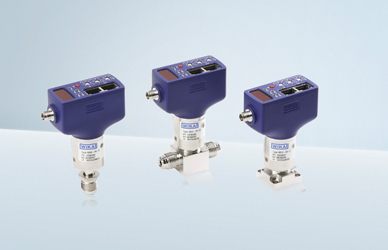
Pressure transducers with EtherCAT® as the communication protocol continue the digitalisation of the semiconductor industry at the transmitter level. In future, in every production plant, dozens of pressure measuring locations will be equipped with them. Their installation environments are usually cramped. The big challenge is therefore to have available suitably compact pressure transmitters with EtherCAT® available. WIKA has developed such a model.
Digitalisation is one of the megatrends that is affecting all areas of our society and will profoundly change it over the years. Industrial companies are networking more and more systems, instruments and processes in this way. There is a dual focus on the semiconductor industry here: It supplies key basic products for digitalisation and has therefore been experiencing considerable growth for years. This in turn means that manufacturers are introducing ever more complex production processes in order to meet the increasing demand.
Cable redundancy increases process reliability
In order to improve the control of individual processes, companies need to link their processes ever more closely and make them more transparent, on the basis of large volumes of data. Connectivity plays a decisive role here. The semiconductor industry primarily relies on the EtherCAT® communication protocol (CAT = “Control Automation Technology”). It has long been integrated into larger instrumentation and control systems. EtherCAT® works with cable redundancy and therefore increases process reliability. Hot-connect and hot-swap functions also enable maintenance work and instrument replacement during EtherCAT® network operation.
New pressure transducer with EtherCAT® based on the smallest sensor of its kind

UHP pressure transducer with EtherCAT® from WIKA: WUD-20-E, WUD-25-E and WUD-26-E (from l. to r.) fit into the standard grid dimension of 28.5 mm.
Manufacturers are now increasingly transferring the digital interface to the transmitter level. This is because it can also be used to integrate small devices into control systems, such as pressure transducers. This type of sensor is responsible for pressure measurement in high-purity gas applications. The installation space available for the measuring instruments there is tight, so compactness is a key criterion. WIKA has therefore further developed the existing WUD-2x pressure transducer, the smallest sensor of its kind on the market, for integration into EtherCAT® networks.
The new instrument model with the designations WUD-20-E, WUD-25-E and WUD-26-E (depending on the process connection) has no limitations in terms of compactness despite the digital interface with two RJ45 ports. It fits into the standard grid dimension of 28.5 mm (1 1/8″). As the first pressure transducer with EtherCAT®, the high-precision and EMC-stable sensor works with SDP 5003.2080 (“Special Device Profile”). In addition to the pressure value, it can also output instrument information such as electronics temperature, runtime, diagnostics and error states.
Contribution to the reduction of downtime
Such data makes process sequences more transparent and their control more precise. The data analysis provides companies with a continuous overview of the system and instrument status (“condition monitoring”) and they can then intervene when actually required. Digitalised measuring locations therefore help to reduce downtime.
Note
Further information on the pressure transducers with EtherCAT® WUD-20-E, WUD-25-E and WUD-26-E can be found on the WIKA website. There you will also find further measurement solutions for the semiconductor industry. In addition, you will receive more information about WIKA as a digitalisation partner on the microsite IIoT Solutions. If you have any questions, your contact will gladly help you.
Also read our posts
Pressure transducers in semiconductor manufacturing: There’s no way around UHP
What is the leading ignition protection type for UHP pressure transducers?

